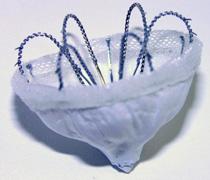
The first-in-man use of the Coherex WaveCrest left atrial appendage (LAA) occluder system was successfully performed recently in New Zealand, launching the WAVECREST 1 trial to evaluate the device's effectiveness. The trial is being carried out in New Zealand, Australia and several European countries and will be used to seek CE mark approval for the device.
The first procedure was performed at Auckland City Hospital in New Zealand by Peter Ruygrok, M.D.
“The Coherex WaveCrest system is a significant advance in LAA occlusion technology,” Ruygrok said. “It offers several major advantages over early LAA devices. It enabled us to optimize the placement of the implant and to seal off the LAA, while minimizing the risk of complications during and after the procedure. The first implantation of this device was extremely successful. WaveCrest presents a valuable new treatment option for patients who suffer from atrial fibrillation and the associated risks of stroke, and possibly enables patients to discontinue difficult-to-manage blood thinners such as Coumadin. This particular patient was at high risk for recurrent stroke, and the structure of the LAA was quite complicated. Nevertheless, the Coherex WaveCrest performed beautifully and our patient is doing quite well.”
Coherex Medical is currently in discussions with the U.S. Food and Drug Administration (FDA) regarding the design of a pivotal trial that may lead to U.S. clearance for the Coherex WaveCrest. The company expects to begin the FDA trial sometime in late 2011.
The LAA is a small pouch-like structure found in every human heart and known as a potential breeding ground for blood clots in patients with atrial fibrillation. It is believed to cause 15 percent of all strokes.
For more information: www.coherex.com


 January 05, 2026
January 05, 2026 









